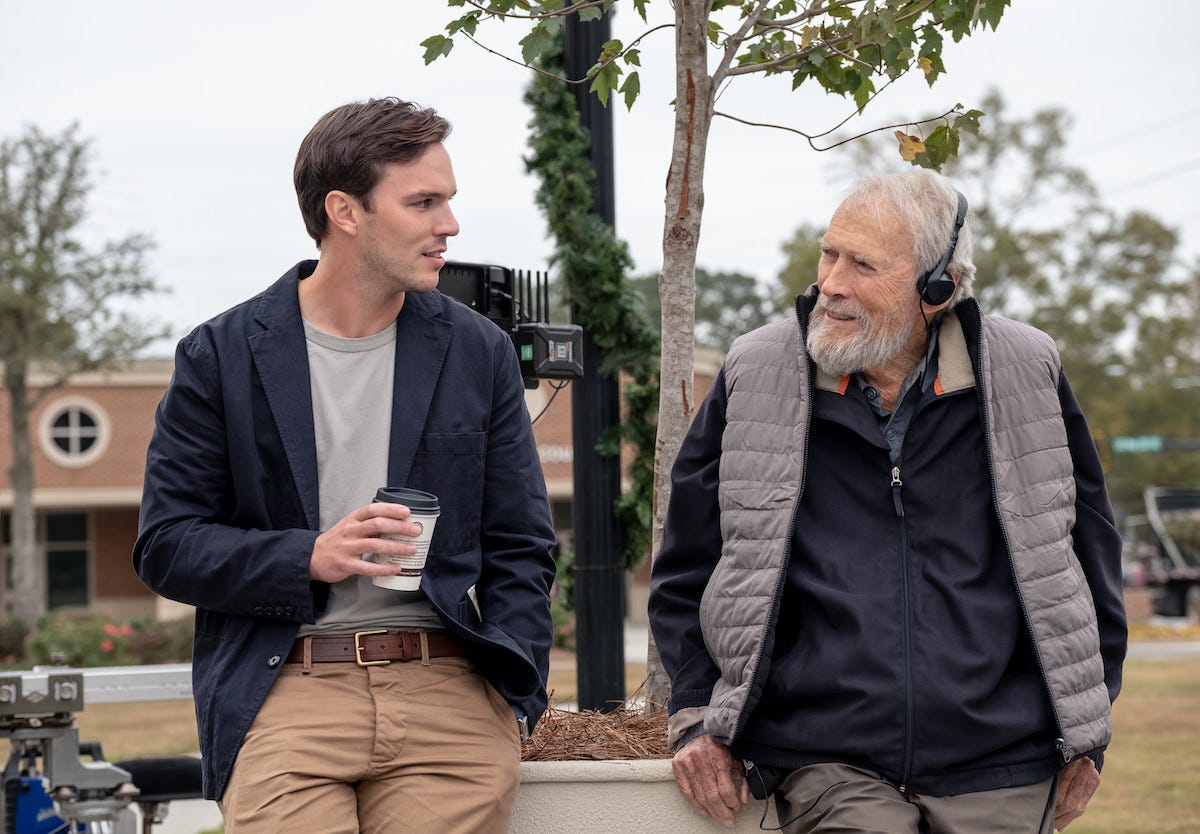On Across the Movie Aisle a couple of Tuesdays ago, Alyssa, Peter, and I discussed the odd case of Clint Eastwood’s Juror #2. In case you didn’t listen to that cons-and-nons segment (how dare you), allow me to recap.
Warner Bros. greenlit the Clint Eastwood-directed courtroom drama starring Nicholas Hoult as a juror who comes to realize he may have accidentally committed the murder that is being tried in front of him and 11 more of his peers. Rather than giving the film a theatrical release—which would entail spending low eight figures on an advertising campaign to justify opening it in 2,500 theaters across the country—WB decided to dump the film in a few dozen screens across the country for a week, spending nothing on advertising, before moving it to premium video on demand (where people could pay to rent it) and then the WB-owned streaming service, Max.
The relegation of what may be the final film from an old master to digital purgatory outraged the chattering classes, who rallied to Eastwood’s side and demanded a proper release. They didn’t get that, precisely, but solid word of mouth and general annoyance at WB honcho David Zaslav seems to have gotten butts in seats: according to Matthew Belloni at Puck, the film earned $9,100 per screen at AMC theaters in its first weekend (a higher per-screen average than anything in the top 20 that weekend) and $5,400 per screen in its second weekend (the second-best per-screen average in the top 20 that weekend, behind only awards-season darling A Real Pain). These aren’t record-breaking numbers or anything, but they are pretty darn good results for a movie that got zero promotional support (and that WB execs are clearly knifing behind the scenes in order to excuse that lack of support).
I am, honestly, skeptical that the film would have put those sorts of averages up in a proper wide release, but you never know. You can make a reasonable business case for and against Eastwood as a business proposition in recent years. On the one hand, American Sniper, Sully, and The Mule were all genuine hits, grossing nearly a billion dollars combined over the last decade. On the other, Cry Macho, Richard Jewell, and The 15:17 to Paris most definitely were not. That said, Cry Macho came out during COVID and went day-and-date to HBO Max, which depressed its box office and The 15:17 to Paris was almost an experimental film, starring the real-life participants of the titular train attack.1 Counterpoint: Juror #2 lacks the star power of Sniper/Sully/Mule, the first two of which were low-key IP plays about well-known American heroes, and it’s in a genre that has largely been relegated to streaming for good reason (audiences have stopped showing up).
Still, the fact that WB didn’t even attempt a proper release is pretty depressing. Having finally seen it this week, Juror #2 is precisely the sort of movie we always say we want more of: It’s a story about adults, written for adults, clocking in at under two hours, without any gloopy special effects. I think Alyssa described it as a young fogey movie, and there are lots of us out there. If nothing else, the movie is an actor’s showcase. Hoult delivers a fairly devastating portrait of a guy who finds himself in the worst possible position: convinced of another’s innocence and his own guilt and terrified of what will happen to his family if he has to suffer the consequences for what he’s (accidentally) done. Toni Collette, playing a prosecutor in the midst of a district attorney campaign, is impressive as the living embodiment of a system that’s torn between expediency and justice, between politics and the law. And Chris Messina, playing a public defender, makes everything he’s in about 15 percent better: He just radiates a sort of quiet intensity that would have made him a real star in previous eras. Plus it has Kiefer Sutherland and J.K. Simmons in bit parts! What’s not to love?
I don’t think this would have put up American Sniper (or even The Mule) numbers, but I don’t see any reason it couldn’t have done Conclave numbers (which has, as of this writing, grossed just under $23 million but on good word of mouth and solid reviews has held spectacularly in its second and third weekends, dropping just 23.7 percent and 18.1 percent, respectively; for comparison’s sake, drops tend to be in the 50 percent range).
Yes, yes, I know: a wider open means spending $20 to $30 million in advertising, which means you need to gross around $50 to $60 million just to recoup that. But the downstream effects of a theatrical advertising campaign are well known at this point: it leads to better PVOD sales and higher streaming numbers once it hits Max. And you get to give Eastwood, a man who has earned the studio more than a billion dollars over the years in addition to delivering numerous Oscar-caliber films, a chance to properly ride off into the sunset.
Our bonus episode of Across the Movie Aisle this week looks at the best movies of the decade (so far!). I don’t think anyone will be surprised by the consensus pick, but there are some interesting oddities sprinkled throughout.
A Real Pain review
Writer/director/star Jesse Eisenberg’s A Real Pain captures a really painful dynamic almost perfectly: the introvert’s curse.
Eisenberg plays David Kaplan, a nebbish who has planned a heritage trip to Poland with his cousin, Benji (Kieran Culkin). The trip is a reunion of sorts; the cousins were very close growing up but have drifted apart a bit as years have passed. David is married with a kid; Benji has struggled a bit in recent years, his aimlessness leading to helplessness and despair. Not helping matters is the recent death of their grandmother, in whose honor they are taking this trip and who bequeathed them the money to pay for it.
Their dynamic is aptly captured before we even see them together: On the way to the airport, David calls Benji, repeatedly, warning about traffic, then letting him know that traffic is letting up, then just to apologize for calling over and over again. The lack of response from Benji other than a big hello when they do connect in the airport is all we really need to know about him.
It’s not just that David is a little shy or weird around the other members of their tour group, as during the introduction when he’s practically apologizing with his eyes for Benji’s outré nature or when the group is walking around Poland and he purposely sits at a table far from the rest of the group. And it’s not just that Benji makes himself at home wherever they are and whomever they’re with, or that he feels comfortable bringing pot to a foreign country, or that he seemingly has no filter around anyone. It’s that regardless of what Benji does—how abrasive his tone is, how weird his outbursts are, how offensive he happens to be—the object of that outburst always ends up liking him more after the fact. As David says, this is somewhat maddening: “My pain is unexceptional, so I don’t feel the need to burden everyone with it.” Needless to say, his extroverted cousin not only doesn’t feel the same way, he doesn’t even seem to realize he’s burdening everyone else with all his nonsense.
And this is the introvert’s curse: to see the extrovert make a fool of himself, behaving in ways that induce cringes, and still walking away beloved.
While there is enormous depth to the events surrounding the Kaplans and the tour they’re on—centuries of Jewish history culminating in the great tragedy of their people—it is this dynamic between them (and the chemistry between Culkin and Eisenberg) that propels the film along, that keeps us invested in what amounts to a sightseeing tour of famous Polish landmarks. It reminds me a bit of In Bruges in that way, and while Martin McDonagh’s film is funnier and has more narrative oomph, both it and A Real Pain are invested in giving outsiders a sense of someplace they’ve never been and might never go.
The failure of Richard Jewell is a far more interesting and nuanced story, one highlighting the complete insanity of so much film discourse during the back half of the first Trump term. It was an awards-season play, meaning it’s one of the few films that relied on critical acclaim to earn its money back. And while some people rightly recognized it as a minor masterpiece, too much of the discussion centered on the idea that the picture was some sort of sotto voce defense of Trump against the FBI (a completely insane supposition) while scolds got mad about the film’s depiction of a journalist becoming romantically involved with a source, something that, as we all know, never ever happens.





I'm with you on Juror No. 2. If your marketing team can't turn this into a $50M grossing film then get a better marketing team. Last week I went to a 6:45 PM screening of Conclave and it was packed with older audiences.
Man, Richard Jewel was done dirty by Twitter.
Looking forward to Juror #2. Thanks for the inside scoop.